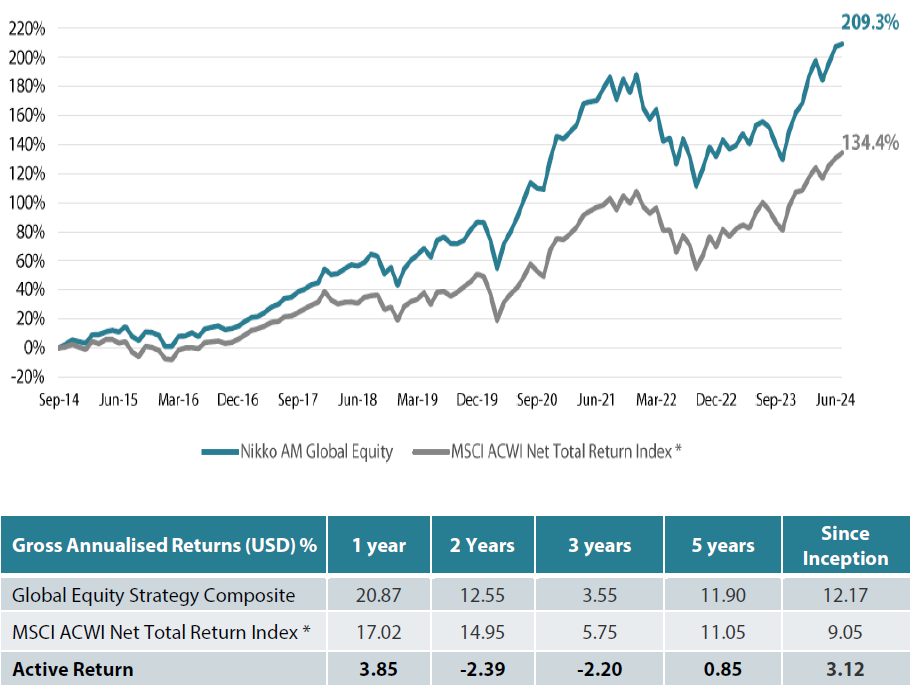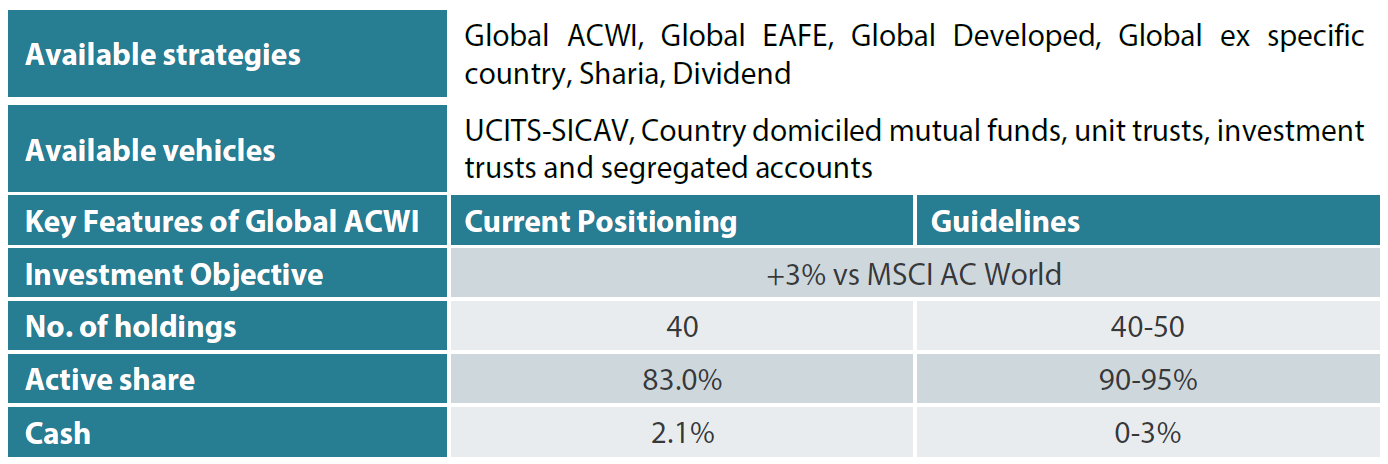Global equity investment philosophy
Our philosophy is centred on the search for “Future Quality” in a company. Future Quality companies are those that we believe will attain and sustain high returns on investment. ESG considerations are integral to Future Quality investing as good companies make for good investment. The four pillars we use to assess the Future Quality characteristics of an investment are:
Franchise - does the company have a sustainable competitive advantage?
Management- does the company make sound strategic and capital allocation decisions?
Balance Sheet - is growth appropriately financed?
Valuation - are the company’s prospects under-appreciated by the market?
We believe that investing in Future Quality companies will lead to outperformance over the full market cycle. Our strategy is based on fundamental, bottom-up research therefore sector and country allocations are a function of stock selection. The Global Equity strategy is a concentrated, high conviction portfolio with a high active share ratio.
Market outlook
Given that over 90% of the AI performance in share prices can be explained by earnings growth which is funded via cash flow and strong balance sheets, the narrative driving AI infrastructure spending is unlikely to come to an abrupt halt any time soon. Perhaps there may be disappointment at the lack of money-spinning applications (like the experience of the internet boom) which may cause investor sentiment to cool. Nevertheless, the improvements in earnings and cash flow appear sustainable so far and are certainly much more attractive than those being produced by many other parts of the economy. However, what is certain is that the AI bandwagon is likely to come to an end and it is unclear where leadership may turn to when that happens.
Perhaps history can provide investors with some guidance. In seven of the nine years since 1952, when the top contributors accounted for more than 40% of S&P’s returns, the returns in the following year were also positive. In those seven subsequent years, high revenue growth companies materially underperformed those with lower, more stable revenue growth. Further analysis suggests cash flow yields of more stable and defensive sectors such as consumer staples and healthcare are approaching levels that would historically suggest we should aggressively tilt that way. Perhaps they are not yet at levels that suggest we should drastically alter the shape of the portfolio, but they appear sufficient enough to add to more stable holdings.
Global sporting events provided a welcome break from the UK’s “snap” election fever or ongoing global conflicts. In the UK, the sporting airtime in July was dominated by Wimbledon where undoubtedly Scottish strawberries were eaten by the ton. Despite his success over his career winning almost 80% of the matches he played, Wimbledon great Roger Federer is estimated to have only won 54% of the points he played. At a recent speech to the graduates of Dartmouth College in the US, he stressed the importance of dropping the emotional baggage of prior losses and exerting “intensity, clarity and focus” on the next point as that is what is important. That seems like valuable advice.
Although new leadership is not yet evident, the Global Equity team will continue to focus on one thing and one thing only – Future Quality. This pertains to companies with robust balance sheets, proven management teams and an ability to grow returns. As Yogi Berra, the legendary Major League Baseball figure known for his enlightening quotes or “Yogi-isms” once said, “You can observe a lot by just watching”. We continue to observe.
Global Equity strategy composite performance to July 2024

Past performance is not a guide to future returns.
*The benchmark for this composite is MSCI ACWI Net Total Return Index. The benchmark was the MSCI ACWI ex AU since inception of the composite to 31 March 2016. Inception date for the composite is 01 October 2014.
Returns are based on Nikko AM’s (hereafter referred to as the “Firm”) Global Equity Strategy Composite returns. Returns for periods in excess of 1 year are annualised. The Firm claims compliance with the Global Investment Performance Standards (GIPS ®) and has prepared and presented this report in compliance with the GIPS. GIPS® is a registered trademark of CFA Institute. CFA Institute does not endorse or promote this organization, nor does it warrant the accuracy or quality of the content contained herein. Returns are US Dollar based and are calculated gross of advisory and management fees, custodial fees and withholding taxes, but are net of transaction costs and include reinvestment of dividends and interest. Copyright © MSCI Inc. The copyright and intellectual rights to the index displayed above are the sole property of the index provider. Any comparison to a reference index or benchmark may have material inherent limitations and therefore should not be relied upon. To obtain a GIPS Composite Report, please contact GIPS_inquiry@nikkoam.com. Data as of 31 July 2024.
Nikko AM Global Equity: Capability profile and available vehicles
(as at July 2024)

Target return is an expected level of return based on certain assumptions and/or simulations taking into account the strategy’s risk components. There can be no assurance that any stated investment objective, including target return, will be achieved and therefore should not be relied upon. Any comparison to a reference index or benchmark may have material inherent limitations and therefore should not be relied upon.
Past performance is not indicative of future performance. This is provided as supplementary information to the performance reports prepared and presented in compliance with the Global Investment Performance Standards (GIPS®). GIPS® is a registered trademark of CFA Institute. Nikko AM Representative Global Equity account. Source: Nikko AM, FactSet.
Nikko AM Global Equity Team

This Edinburgh based team provides solutions for clients seeking global exposure. Their unique approach, a combination of Experience, Future Quality and Execution, means they are continually “joining the dots” across geographies, sectors and companies, to find the opportunities that others simply don’t see.
There are four key areas that make our strategy different:
– a focus on Future Quality companies – a different and clear philosophy
– a distinctive team culture – a tight-knit team with a process built on openness and respect
– unique execution, including rigorous team challenge of every idea
– differentiated portfolios, with a strong track record in stock-picking and ESG integration
Future Quality companies
We believe that companies with superior long-term returns on investment will deliver better performance. We call these Future Quality companies, and it is only these companies that make it into client portfolios. We search for Future Quality through analysis and financial modelling of companies that we expect to deliver over the next five years, and beyond. This approach is supported by academic evidence that businesses with high and improving returns on invested capital provide superior compound performance over the long term. With this investment time horizon, the sustainability of returns is a crucial ingredient of our Future Quality approach. We have found that companies developing solutions to ESG issues and management teams providing value to all stakeholders are more likely to be successful at sustaining high returns on invested capital over the long-term.
Distinctive team structure and culture
We believe that our collective knowledge and experience are powerful tools for delivering investment performance. Since 2011, we have operated a team-based approach to uncovering Future Quality investment ideas and have fostered a strong group dynamic. Individually, each Portfolio Manager is an expert investor with a broad skillset and experience of many market cycles.
We work in a flat structure, where all our Portfolio Managers have a dual role that combines investment analysis and investment management responsibilities. With individual analytical coverage split along industry lines, each Portfolio Manager is a specialist in the stocks and sectors they cover.
We all actively challenge the ideas and analysis of colleagues throughout the investment process, in an open atmosphere of vigorous and constructive debate. Portfolio Analysts work alongside Portfolio Managers, typically researching thematic trends that could influence and uncover future investment opportunities.
We take collective responsibility for approving stocks for the portfolio, and therefore there is joint accountability for performance. As such, it is in everyone’s interest to ensure that the investment analysis is thorough and that no stone is left unturned in the search for Future Quality.
We believe that the broad experience of our Portfolio Managers and distinctive team-based approach that sees everyone contributing to the strategy, increases the probability of successfully uncovering Future Quality.
Unique execution
Our tight-knit team approach and flat structure enable us to execute in a transparent way, including a rigorous team challenge of every idea. By using our strict Future Quality standards, we can identify long-term winners from the broader universe, to narrow down a comprehensive watch list and around 100 deep dive researched ideas. This is within a unique framework of individual accountability for the underlying analysis and company research, combined with the collective challenging of assumptions at the team level. Our proprietary ranking tool creates a disciplined process to compare and rank attractive opportunities and ensures that at the portfolio construction phase, only our best-ranked ideas receive the most committed weights in client portfolios. We believe our culture is key, and the collective ownership of our research process brings the best portfolio outcomes for clients.
Differentiated portfolios
We deliver a high-conviction Global Equity strategy for clients that is not constrained by benchmarks. As such, Future Quality can be sourced from listed businesses across any geography or sector. And, in a world awash with investment prospects, our disciplined, accountable and transparent process helps us to focus solely on building portfolios from companies that best meet our specific Future Quality criteria.
In terms of balancing risk and reward, our track record shows that we consistently deliver attractive returns on a lower risk-adjusted basis compared with peers and the global reference benchmark. The high active share and concentrated number of holdings help ensure that our Future Quality stock-selection process delivers differentiated portfolios.
Risks
Emerging markets risk - the risk arising from political and institutional factors which make investments in emerging markets less liquid and subject to potential difficulties in dealing, settlement, accounting and custody.
Currency risk - this exists when the strategy invests in assets denominated in a different currency. A devaluation of the asset's currency relative to the currency of the strategy will lead to a reduction in the value of the strategy.
Operational risk - due to issues such as natural disasters, technical problems and fraud.
Liquidity risk - investments that could have a lower level of liquidity due to (extreme) market conditions or issuer-specific factors and or large redemptions of shareholders. Liquidity risk is the risk that a position in the portfolio cannot be sold, liquidated or closed at limited cost in an adequately short time frame as required to meet liabilities of the Strategy.



